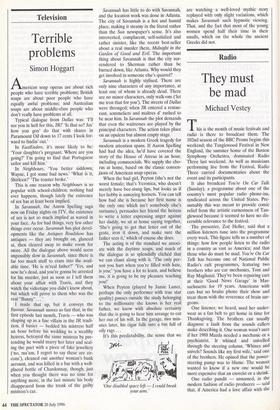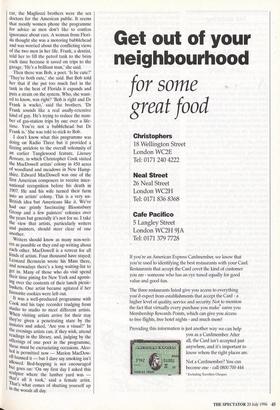Radio
They must be mad
Michael Vestey This is the month of music festivals and radio is there to broadcast them. The 102nd season of the BBC Proms begins this weekend; the Tanglewood Festival in New England, the summer home of the Boston Symphony Orchestra, dominated Radio Three last weekend. As well as musicians performing live from the Festival, Radio Three carried documentaries about the event and its participants.
It also broadcast You're On Car Talk (Sunday), a programme about one of the country's most popular radio phone-ins, syndicated across the United States. Pre- sumably this was meant to provide comic relief from the artistic earnestness of Tan- glewood because it seemed to have no dis- cernible relevance to the festival.
The presenter, Zoe Heller, said that a million listeners tune into the programme every week. This figure tells us a number of things: how few people listen to the radio in a country as vast as America; and that those who do must be mad. You're On Car Talk has become one of National Public Radio's cult programmes, featuring two brothers who are car mechanics, Tom and Ray Magliozzi. They've been repairing cars at their 'Good News Garage' in Mas- sachusetts for 19 years. Americans with cars but no brains phone their show and treat them with the reverence of brain sur- geons.
One listener, we heard, used her under- wear as a fan belt to get home in time for Thanksgiving. The brothers can usually diagnose a fault from the sounds callers make describing it. One woman wasn't sure if her 1988 Mazda needed a mechanic or a psychiatrist. It whined and snivelled through the steering column. 'Whines and snivels? Sounds like my first wife,' said one of the brothers. He opined that the power- steering pump was to blame. The woman wanted to know if a new one would be more expensive that an exorcist or a shrink. One radio pundit — unnamed, in the modern fashion of radio producers — said that, if America had a love affair with the car, the Magliozzi brothers were the sex doctors for the American public. It seems that mostly women phone the programme for advice as men don't like to confess ignorance about cars. A woman from Flori- da thought she was a motoring bubblehead and was worried about the conflicting views of the two men in her life. Frank, a dentist, told her to fill the petrol tank to the brim each time because it saved on trips to the garage. 'He's a brilliant man,' she said. Then there was Bob, a poet. 'Is he cute?' 'They're both cute,' she said. But Bob told her that if she put too much fuel in the tank in the heat of Florida it expands and Puts a strain on the system. Who, she want- ed to know, was right? 'Bob is right and Dr Frank is wacko,' said the brothers. 'Dr Frank sounds like a real anally-retentive kind of guy. He's trying to reduce the num- ber of gas-station trips by one over a life- time. You're not a bubblehead but Dr Frank is.' She was told to stick to Bob.
I don't know what this programme was doing on Radio Three but it provided a fizzing antidote to the overall solemnity of an earlier Tanglewood feature, Literary Retreats, in which Christopher Cook visited the MacDowell artists' colony in 450 acres of woodland and meadows in New Hamp- shire. Edward MacDowell was one of the first American composers to receive inter- national recognition before his death in 1907. He and his wife turned their farm into an artists' colony. This is a very un- British idea but Americans like it. We've had our grimly fascinating Bloomsbury Group and a few painters' colonies over the years but generally it's not for us. I take the view that artists, particularly writers and painters, should steer clear of one another.
Writers should know as many non-writ- ers as possible or they end up writing about each other. MacDowell is a retreat for all kinds of artists. Four thousand have stayed; Leonard Bernstein wrote his Mass there, and nowadays there's a long waiting-list to get in. Many of those who do visit spend their time pining for New York and agonis- ing over the contents of their lunch picnic- baskets. One artist became agitated if her favourite cookies were left Out.
It was a well-produced programme with Cook and his tape recorder trudging from studio to studio to meet different artists. When visiting artists arrive for their stay they're given a penetrating stare by the inmates and asked, 'Are you a visual?' In the evenings artists can, if they wish, attend readings in the library, and, judging by the offerings of one poet in the programme, these must be excruciating occasions. Alco- hol is permitted now — Marion MacDow- ell banned it — but I dare say smoking isn't allowed. Bed-hopping is not encouraged but goes on: 'On my first day I asked this sculptor where the lumber yard was that's all it took,' said a female artist. That's what comes of shutting yourself up in the woods all day.



























































 Previous page
Previous page